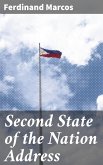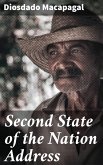In the "Thirteenth State of the Nation Address," Ferdinand Marcos articulates his vision for the Philippines during a pivotal moment in the nation's history. Delivered in a period marked by political turbulence and social unrest, the address employs a rhetorical style that combines assertive nationalistic fervor with an appeal to economic development and stability. Marcos's speech reflects the literary context of political discourse during the 1970s, where leaders often used grandiloquent language to reinforce their mandates, highlighting key achievements while deflecting criticism. His oratory serves as both a government manifesto and a potent example of political propaganda, steeped in the complexities of authoritarian governance. Ferdinand Marcos, who ruled the Philippines for over two decades, was shaped by his experiences during World War II, his rise in political ranks, and the pressures of Cold War geopolitics. His tenure was characterized by a mix of populism and dictatorial control, deeply influencing his perspectives on governance and economic policymaking. The "Thirteenth State of the Nation Address" embodies his quest for legitimacy and his commitment to promoting national pride amidst the dichotomies of modernization and repression. For readers interested in understanding the interplay between rhetoric and power, this address is an essential text. It provides insight into Marcos's leadership style and the historical context of his regime, offering a lens through which the complexities of Philippine society during martial law can be explored. This work is a significant contribution to the study of political communication and history.
Dieser Download kann aus rechtlichen Gründen nur mit Rechnungsadresse in A, B, BG, CY, CZ, D, DK, EW, E, FIN, F, GR, H, IRL, I, LT, L, LR, M, NL, PL, P, R, S, SLO, SK ausgeliefert werden.









